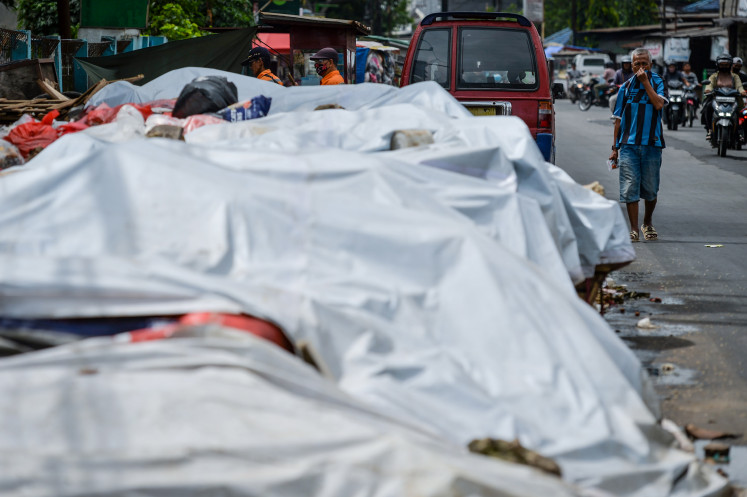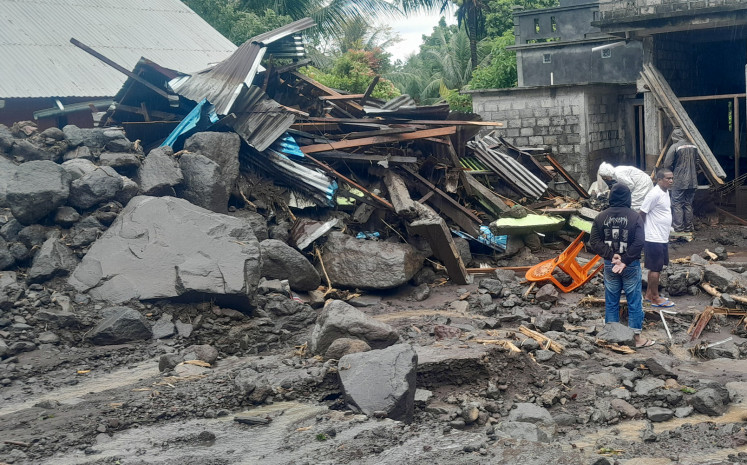Popular Reads
Top Results
Can't find what you're looking for?
View all search resultsPopular Reads
Top Results
Can't find what you're looking for?
View all search resultsCOVID-19: ‘The Hunger Games’ or cash cow for Big Pharma?
Some individuals and companies have become massively richer as a result of the pandemic.
Change text size
Gift Premium Articles
to Anyone
I
ndonesia bagged gold medals for badminton at the Tokyo Olympics — a historic win! Thanks to Greysia Polii and Apriyani Rahayu, it was the first ever gold for Indonesia’s women’s doubles, but it was part of a gold legacy for badminton that we have had since 1958.
Greysia and Apriyani’s win was a much needed shot in the arm — of the non-vaccine kind! — to lift the spirits of a pandemic-bashed Indonesia.
According to the National Geographic (July 27), “Indonesia is a new COVID-19 epicenter. The peak has yet to come.” As if the title isn’t depressing enough, it adds a subtitle: "After the pandemic, we will probably have a lost generation."
Great. (See also “RI braces for worst-case coronavirus scenario”, The Jakarta Post, July 16 and “Indonesia a global pariah?”, Aug. 2).
Almost one and a half years into the worldwide COVID-19 pandemic, you would have thought that we would all have become wiser, more knowledgeable and governments more savvy at dealing with the issue. But no, instead things have become even more confusing and chaotic. Conspiracy theories abound, except that, say, six months later, they’re not. For example, the idea that the virus came from a lab in was Wuhan, China, was not given any credence until it was – a year and a half later.
The point is, who can say what the truth is regarding COVID, its origins, the efficacy of vaccines, as well as so-called vaccine “conspiracy theories”? Who defines what the truth is? Governments? Big Pharma? Mainstream media? Bill Gates?
Vaccines are being touted as the panacea for the recovery from the global pandemic. But are they? Vaccine hesitancy is seen as being the major obstacles to this aim. But what about Albert Bourla, the CEO of Pfizer himself, claiming he doesn’t need to be vaccinated? He cites the reason that he is 59, in good health, not in the front line of the pandemic and his “type” is not recommended to be vaccinated. Hmm, interesting.
Well, there have been many cases of vaccinated people getting infected anyway. I know of many cases in Indonesia, and a recent study in the United States showed that three-quarters of people infected with the coronavirus had been vaccinated (see “74 percent of COVID-19 cases in local outbreak were among vaccinated: Study”, Kyodo News, Aug. 1).
Then there is the issue of vaccine monopolies. A report published by the People’s Vaccine Alliance with the title “The cost of vaccinating the world against COVID-19 could be at least five times cheaper if pharmaceutical companies weren’t profiteering from their monopolies on COVID-19 vaccines” says it all.
“New analysis by the Alliance shows that the firms Pfizer/BioNTech and Moderna are charging governments as much as US$41 billion above the estimated cost of production. Colombia, for example, has potentially overpaid by as much as $375 million for its doses of the Pfizer/BioNTech and Moderna vaccines, in comparison to the estimated cost price,” the report reads.
“Despite a rapid rise in COVID cases and deaths across the developing world, Pfizer/BioNTech and Moderna have sold over 90 percent of their vaccines so far to rich countries, charging up to 24 times the potential cost of production.” What??
On top of the pandemic, there is another pandemic going on that is also killing people: the hunger pandemic. Check out the Oxfam report: “World in the midst of a ‘hunger pandemic’: Conflict, coronavirus and climate crisis threaten to push millions into starvation”, or the World Bank report: “Food Security and COVID-19”, dated July 16.
“An increasing number of countries are facing growing levels of acute food insecurity, reversing years of development gains. Even before COVID-19 reduced incomes and disrupted supply chains, chronic and acute hunger were on the rise due to various factors, including conflict, socioeconomic conditions, natural hazards, climate change and pests,” the World Bank report reads.
“COVID-19 impacts have led to severe and widespread increases in global food insecurity, affecting vulnerable households in almost every country, with impacts expected to continue through 2021 and into 2022.”
Anyone developing a vaccine for hunger and inequality anytime soon?
Another reason for the COVID-19 surge in Indonesia is the slow rate of vaccinations, with only 9.7 percent of the population having been vaccinated once and 7.4 percent having received both doses (See “Slow vaccination takes toll on Indonesia in uneven global recovery”, The Jakarta Post, Aug 2).
Given the slowness of the vaccination program and with people dying at an alarming rate, why don’t we open up to alternative treatments? Ivermectin for example, has been proven empirically to be effective in treating the coronavirus in India and areas in Indonesia, but the government still refuses to approve its use, saying that it was still undergoing trials. How many trials have the government-endorsed vaccines gone through?
Then there is the issue of testing. Why are vaccines free while COVID testing is not? How can President Joko “Jokowi” Widodo say that “the extension of the current curbs should be accompanied by massive testing, tracing and treatment efforts” if testing is not conducted widely and at no cost?
Pak Budi Gunadi Sadikin (Health Minister), can you please explain why this has not been the case? A PCR test can cost as much as Rp 750.000 (US$52.45), unless you go to the community health center (Puskesmas) where it is free, but I haven’t heard of people rushing in hoards to be tested there.
More and more disapprove of Jokowi’s pandemic handling (see the Post, July 21), but an article written by Chris Wibisana, goes so far as to say that “Citizen volunteers helping other citizens during the COVID-19 pandemic exposes that the government has betrayed us” (Proyek Multatuli, July 29). Wow, that’s quite an indictment!
A massive crisis like COVID-19 should be a way to make a paradigmatic shift. Instead, it’s business as usual and even more with the pandemic being used as a cash cow for big pharma. Some individuals and companies have become massively richer as a result of the pandemic; rich countries are beginning their economic recovery while poor countries who were already lagging behind will suffer even more.
Talking about the hunger pandemic, it reminds me of the 2008 dystopian novel trilogy The Hunger Games, by American author Suzanne Collins. Many of the themes of the trilogy can be applied to the current pandemic situation: massive class and wealth disparity; widening gap between rich and poor nations; differential access to resources; the power of a small, oligarchic elite that determines the fate of the masses. There is also unaccountable governance, violence against the people, growing distrust of government and political leaders, and even “science”. Will things have to get much, much worse before people rise up and revolt to make things better for themselves?
It was breath-taking to watch the skill and stamina of our two badminton heroines, playing long, seemingly never-ending rallies, eventually defeating their Chinese opponents.
Like our gold badminton legacy, Indonesia has a legacy of incredible riches. But will the Indonesian people have the skills and stamina to play out The Hunger Games that has been forced upon them with rules they never agreed upon?
***
The writer is the author of Julia’s Jihad.










